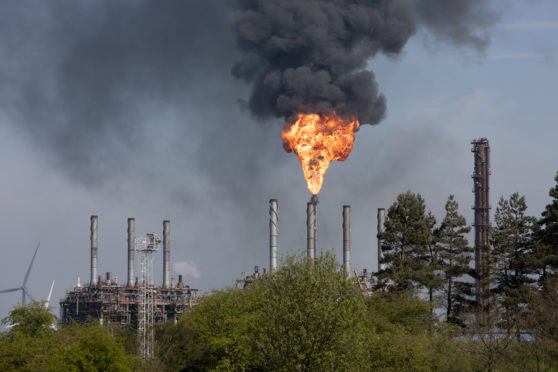
Scotland’s share of North Sea oil and gas tax receipts fell by around half in the last year to £724 million, according to new tax and spending figures.
The Scottish Government has published the Government Expenditure and Revenue Scotland (GERS) report for 2019-20.
It shows Scotland’s net fiscal balance, including North Sea revenues, was in the red by £15.1 billion, 8.6% of gross domestic product (GDP), compared to a shortfall of £13.2bn in 2018-19.
That’s compared to total UK deficit of 2.5% of GDP.
Scotland’s illustrative geographic share of North Sea revenues fell by more than £600m from £1.4bn last year to £724m in 2019-20 – 111% of the UK’s £650m revenues.
The drop was put down to “a number of factors” including the oil price, the sterling dollar exchange rate and operating expenditure.
Figures for the period show overall North Sea production declined slightly with reduced output at several large gas terminals, as well as the prolonged shutdown of the Mossmorran natural gas liquid (NGL) plant in Fife.
Crude oil and NGL production fell by 1.8% and annual gas production by 0.7%.
During 2019-20, the oil price averaged $61.4 per barrel, 12% lower than the previous year, while the Covid-19 pandemic also caused prices to be “extremely volatile”, ranging from between $74.9 to $14.9.
However, the report showed onshore revenues increased by 1.7% to £65.2bn – equivalent to 7.9% of UK total non-North Sea revenues, 0.3% lower than Scotland’s share of the UK population.
Without oil and gas receipts, Scotland’s net fiscal deficit would have been £15.9bn, 9.4% of GDP.
Katy Heidenreich, Oil and Gas UK’s supply chain and operations director said: “The sector is focused on driving its recovery amid the fallout from the pandemic and the challenge of record low oil and gas prices.
“Key to achieving that recovery is the support of both the UK and Scottish Governments in recognising the role that the sector plays in maintaining the UK’s supply of domestic energy, the hundreds of thousands of jobs supported across the UK and of course the important role the UK oil and gas sector can play in transitioning to a net zero future.”
However, Mairi Spowage, deputy director of the Fraser of Allander Institute at the University of Strathclyde claimed the importance of North Sea revenues is likely to lessen as the energy transition gathers pace.
She said: “Oil and gas receipts have been a key feature of the discussions around the overall picture for public finances in Scotland, especially when you’re talking about constitutional change. But to be frank, their importance in terms of the overall contribution to tax receipts has diminished in recent years and it’s now at a fairly low level.
“The importance of the oil and gas sector is still there – offshore extraction is still over 5% of the economy in Scotland and you’ve got all the onshore supply chains that rely on that. But we can’t just think about the industry in terms of the tax receipts it generates, we also need to think about the levels of employment it provides and the businesses it supports through the sector.
“If we look at the Growth Commission report, the most recent prospectus on what an independent Scotland could look like, it was very much talking about the revenue raised from oil and gas being a bonus underlying income. Given the level it’s currently at, as well as the focus on the energy transition, I imagine the importance of the oil price to constitutional issues will diminish.”
GERS figures are seen as an indicator of how Scotland would fare outside the UK and, as such, they’ve been on the frontline of the debate between pro-union and pro-independence supporters over the past few years.
Alexander Burnett, MSP for Aberdeenshire West and Scottish Conservative shadow energy minister said: “I don’t think the hit to oil and gas revenues will be a surprise to anyone. Last year the price of a barrel of oil was sitting at around $60, now it’s fallen to around $45.
“We’re waiting for the sector deal and, from what I understand, discussions are pretty positive so that’s the main thing that will help to boost the North Sea industry.
“The GERS figures today just show the whole idea of separation based on oil being $100 dollars or more a barrel, which is what people were suggesting at the time of the Scottish independence referendum in 2014, has just been scuttled. The reality is that these shocks to the North Sea sector will happen and the simple message that staying part of the UK is to the benefit of everyone in Scotland couldn’t be clearer today.”
However, Scottish Finance Secretary Kate Forbes said she fears Scotland’s recovery post-Covid-19 could be hampered unless Holyrood is granted “additional financial powers”.
She said: “The Scottish Government has responded swiftly to the challenges of COVID-19 and has worked hard to protect Scotland’s economy, providing over £2.3 billion of support to businesses.
“The public finances were already facing challenges this year due to the uncertainty caused by Brexit. We are now witnessing an unprecedented health and economic crisis. Countries across the world, including the UK, have increased borrowing to record levels and, as we emerge from the pandemic, high fiscal deficits will inevitably be one of the consequences.”
